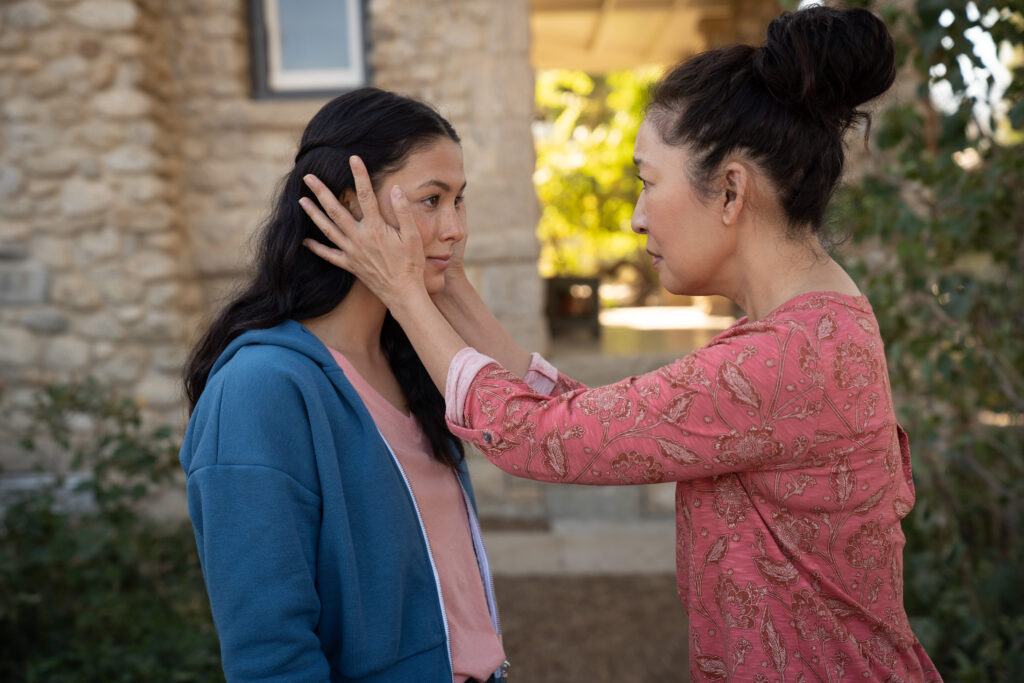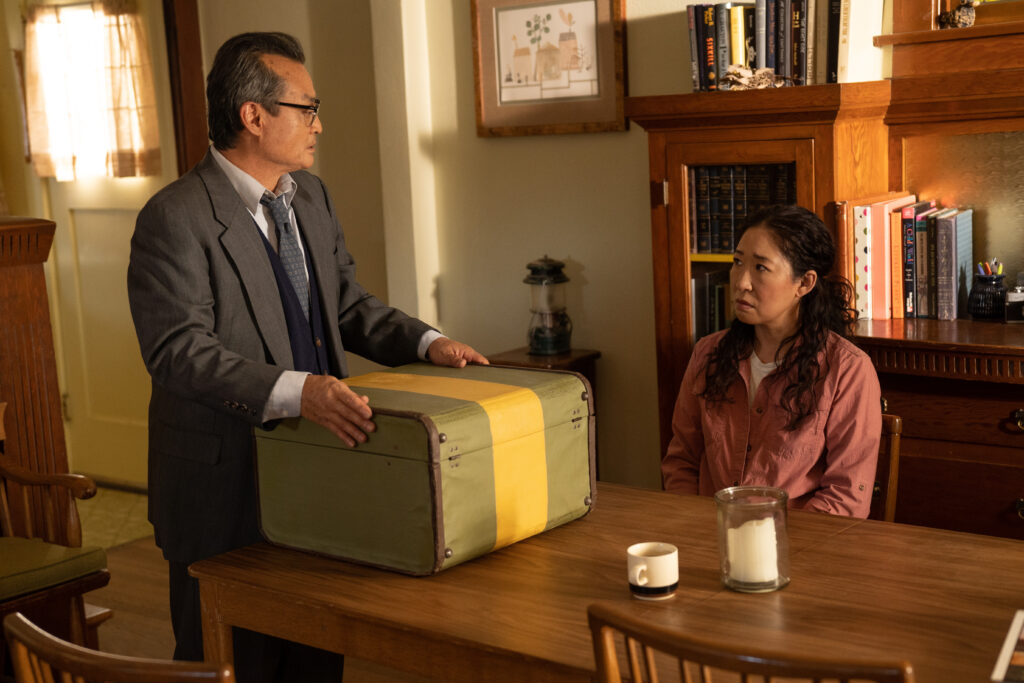March 18, 2022
by Carla Hay

Directed by Iris K. Shim
Some language in Korean with subtitles
Culture Representation: Taking place in an unnamed part of the U.S., the horror film “Umma” features a cast of Asian and white characters representing the working-class ad middle-class.
Culture Clash: A single mother, who works as a beekeeper/honey merchant, is haunted by memories of her abusive mother.
Culture Audience: “Umma” will appeal primarily to people who are fans of star Sandra Oh, whose talent is wasted in this boring and predictable horror movie.

In the forgettable and formulaic horror flick “Umma,” the main character is a beekeeper with mother issues. Bees in a hive have more purpose and intelligence (and can scare more people) than this silly mess of a film. So much of “Umma” is a waste: A waste of a talented cast. A waste of a potentially good idea for a horror story. And a waste of time to anyone who watches this disappointing flop.
Written and directed by Iris K. Shim, “Umma” gets its title from the Korean word for “mother.” That’s because “mother issues” are at the center of a Korean American family haunted by abuse. “Umma” takes place in an unnamed part of the U.S. but was actually filmed in the Canadian province of British Columbia.
In “Umma,” Amanda (played by Sandra Oh) is the only child of Korean immigrants, who are now deceased. Amanda is a single mother to a daughter named Chris (played by Fivel Stewart), nicknamed Chrissy, who’s about 17 years old. Amanda is a beekeeper/honey maker who owns a small business called Chrissy’s Honey Bees, where Amanda and Chris are the only workers.
Most of their honey is sold online, with help from Amanda’s friend Danny (played by Dermot Mulroney), who owns a hardware store not too far away and who manages the website and social media for Chrissy’s Honey Bees. Business has recently been doing so well for Chrissy’s Honey Bees, many of the products are selling out. Danny tells Amanda that she might have to hire more people to help her keep up with customer demand.
Later in the movie, it’s revealed that Amanda started this business only because Chris became obsessed with bees, and Amanda wanted a way to have a closer bond with her daughter. Amanda previously had a less risky and more financially stable job as an accountant, and she had to overcome her fear of bees to start this business. Because of this personal sacrifice, Amanda expects Chris to work with her in the business as long as possible.
Amanda is extremely protective and controlling of Chris, who has been homeschooled her entire life and has no friends. Chris’ father is never seen or mentioned in the movie, and he’s never been involved in raising her. Later in the movie, when someone asks Amanda where her husband is, she replies defiantly that she’s never felt the need to have a husband.
Amanda is deeply fearful of electrical appliances and distrustful of modern technology—so much so that she doesn’t allow Chris to have a smartphone. Chris has to make do with an outdated mobile flip phone. And needless to say, there are no TVs or computers in their house, which is an isolated, rural area. Of course it’s in a remote area. This is a horror movie, but the scares in “Umma” are underwhelming.
The opening scene of “Umma” shows why Amanda has a fear of electrical appliances: As a child, Amanda’s domineering mother would physically abuse her with heated electrical wires. This abuse is not shown in graphic detail in the movie’s flashbacks, but enough is shown for viewers to know what’s happening. Hana Marie Kim portrays Amanda as a child in these flashbacks.
Amanda’s family history is revealed in bits and pieces through conversations and flashbacks. Amanda’s parents had a happy marriage until they moved from Korea to the United States. Amanda’s mother (played by MeeWha Alana Lee) became depressed and difficult to the point where Amanda’s father couldn’t take it anymore, and he abandoned his wife and daughter. (Amanda’s father is never shown in the movie.)
Amanda’s mother then became increasingly paranoid that Amanda would leave her. In the flashback shown in the movie’s opening scene, a young Amanda can be heard wailing in fear, “Umma, I promise I won’t run away again,” before she can be heard screaming as her mother inflicts some violent abuse on her. Expect to see several scenes of Amanda waking up from nightmares.
You know where all of this is going, of course. Amanda is afraid that she’ll end up just like her mother. Amanda has lied to Chris about her family background, by telling Chris that she was raised by two people named Gloria and Bill, who died before Chris was born. The movie shows whether or not Chris finds out the truth. Amanda is also upset that Chris intends to apply for admission to West Mesa University, which is in another state.
In the meantime, Amanda unexpectedly gets a visit from someone she doesn’t want to see: Her mother’s brother (played by Tom Yi), who does not have a name in the movie. However, he knows Amanda by her Korean birth name: Soo-Hyun, which is a name that Amanda hasn’t used since her very unhappy childhood.
What’s the reason for this unannounced visit from Amanda’s uncle? After he scolds her for not being in touch with the family and for making it difficult to find her, he tells Amanda that Amanda’s mother died a few months earlier. He’s there to deliver a small trunk that has her mother’s ashes and several of her mother’s most treasured belongings. One of these items is a Hahoetal, which is a Korean death mask.
It’s at this point in the movie that you know the ghost of Amanda’s mother will begin haunting Amanda’s home and the surrounding property. But does this ghost really exist? Or is she a figment of Amanda’s imagination? The movie wastes a lot of time with predictable jump scares in a weak attempt to confuse viewers over what’s real and what might be Amanda’s delusions.
And it should come as no surprise that it’s yet another horror movie where the main character’s mental stability is questioned because this person claims to be seeing an evil spirit. But what other people see is Amanda having blackouts while sometimes wearing her mother’s clothes. And predictably, Amanda becomes increasingly disturbed.
There’s nothing truly scary or unpredictable about anything that’s presented in “Umma.” Yes, there are violent attack scenes and people screaming when things get out of control, but too much of it is shown in a very stale manner that’s been done many times already in better horror movies. And for a movie that takes place mostly on a beekeeping farm, there’s surprisingly very little use of the bees in the movie’s terror scenes.
“Umma” has a somewhat time-wasting subplot about Chris becoming friendly with Danny’s teenage niece River (played by Odeya Rush), who gives Chris confidence-boosting pep talks about how it’s okay to be a weirdo and a misfit. Unfortunately, everyone in the movie, except for complicated and confused Amanda, is written as bland, two-dimensional characters. The movie also badly mishandles mental health issues.
The technical aspects of “Umma” are competent, except for an almost laughable visual-effects scene involving a very fake-looking fox with multiple tails. This creature is supposed to be terrifying, but looks like it belongs in a kiddie cartoon, not a horror movie. And with the manifestation of Amanda’s mother, “Umma” tritely uses the Hahoetal death mask as a symbol for how people sometimes hide their true selves from the world, since it’s implied that Amanda’s mother was able to keep her child abuse crimes a secret.
“Umma” missed some big opportunities to have quality depictions of generational trauma. The movie also has a very limited view of Korean heritage, which is mostly used in “Umma” as a plot device to invoke fear in the characters. “Umma” is just a series of half-baked jump scares and underdeveloped characters, with a rushed ending that leaves some important questions unanswered and audiences feeling like “Umma” is a just another ripoff horror movie.
Stage 6 Films released “Umma” in U.S. cinemas on March 18, 2022.
